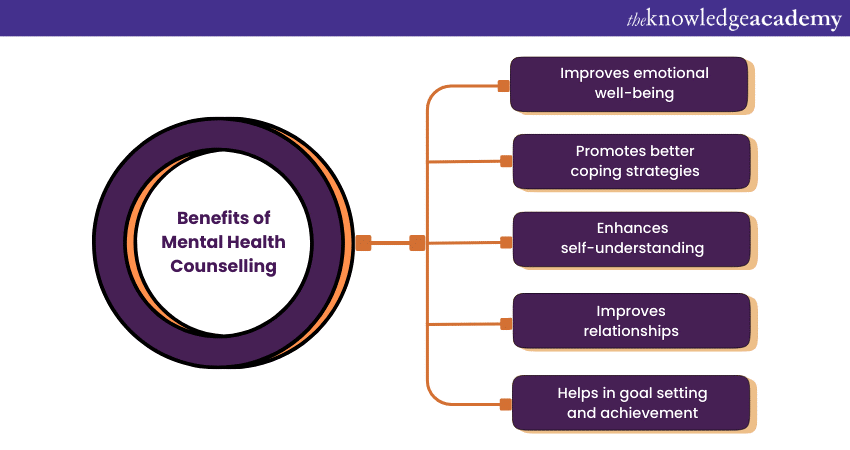The 45-Second Trick For Mental Health Counseling
The 45-Second Trick For Mental Health Counseling
Blog Article
8 Simple Techniques For Mental Health Counseling
Table of ContentsSome Ideas on Mental Health Counseling You Need To KnowSome Known Details About Mental Health Counseling The Definitive Guide for Mental Health CounselingHow Mental Health Counseling can Save You Time, Stress, and Money.Not known Factual Statements About Mental Health Counseling
Through therapy, you can gain insight right into your very own patterns of actions and interaction, which can cause more satisfying and satisfying relationships with pals, household, and charming partners. What we think, we show up. If you're eaten with unfavorable emotions and negative ideas that are conflicting with your life, treatment can assist., or there are various other unfavorable ways you act. Therapy can help you alter those behaviors that are having a negative influence on your world and relationships.

The relevance of treatment goes past your psychological wellness. Getting treatment to address certain facets of your life can assist you be more efficient in other areas, consisting of work. Some study has also shown that there's a straight connection between seeking psychological health and wellness aid and a reduction in missed out on job.

Mental Health Counseling Fundamentals Explained
There are also much more advantages of treatment than simply the ones we have reviewed., or build partnerships (romantic or those with household or friends) in a healthy way.
For the purpose of today research, regarded advantages and barriers to mental health help-seeking are being discovered. Previous study located that regarded barriers have a substantial effect on university student' wellness habits options (Von Ah, Ebert, Ngamvitroj, Park & Kang, 2003). Regarded benefits and obstacles to help-seeking were especially selected because of their impact on decision-making and inevitably action (Glanz, Rimer, & Su, 2005).
Today research study looks for to take a look at whether or not preconception offers as an obstacle to treatment amongst university student. Eisenberg et al. (2011) suggested that uncertainty regarding therapy effectiveness is another barrier to participating in therapy. Study searchings for revealed that university student recommended several obstacles to participating in therapy. Mental Health Counseling. Among these were: (1) liking to handle psychological health issue themselves, (2) not having enough time to take part in therapy, (3) questions concerning whether psychological health treatment is reliable in remediating troubles, (4) a belief that anxiety is regular or the issue will certainly improve without therapy, (5) absence of money, and (6) stress over what others would believe if they learnt about therapy engagement.
(2006) reported comparable variables as obstacles to looking for therapy and additionally found that a mistrust of companies might hamper trainees from looking for assistance. Personnel in school mental health and wellness centers might be viewed as unfriendly, and long wait times for services may be "off-putting" for students. Factors helping with a from this source lot more positive attitudes are typically at the opposite pole of those factors identified as obstacles.
An Unbiased View of Mental Health Counseling
One in 3 (34.6%) reported residing on campus and one in 4 (23.3%) reported living with moms and dads. Nearly half of pupils were associated with university organizations and 1 in 10 reported remaining in a society or sorority. Greater than one-third of pupils (38.1%) reported that they had a member of the family or friend with an identified psychological health condition.

An Unbiased View of Mental Health Counseling
Univariate F-tests identified particular subscale items that considerably varied. Women were less likely than males to perceive individuals who go to counseling as mentally weak, people that most likely to therapy as insane, to feel that individuals with mental health problems should handle problems by themselves, that people that go to counseling as not able to address troubles, that people who go to counseling slouch, and to really feel that individuals who most likely to therapy are different from normal people in an adverse method.
Research study results exposed that females were substantially less likely than males to hold stigma-related attitudes. This follows previous research study which also located that men hold higher degrees of perceived preconception than women (Chandra & Minkovitz, 2006). Based upon research findings, it is noticeable that males may be less most likely than women to seek therapy as a result of low viewed obstacles as well as high stigma-related mindsets.
The 6-Minute Rule for Mental Health Counseling
Additionally, university health professionals may offer important site educational programs targeting males with information on the benefits of mental health treatment and the significance of seeking help when needed. All strategies must be examined with future study to establish the result on university student, especially males. In contrast to general populace researches which disclose that females are most likely to look for mental health solutions contrasted to guys (Haunstein et al., 2006; Mackenzie, Gekoski, & Knox, 2006), the present study located no substantial distinctions in the number of perceived obstacles to help-seeking behaviors based upon sex.
This searching for was unforeseen and could highlight that those that had actually gotten therapy had a much better concept of wait times and various other "access" obstacles that may make it tough to begin treatment. Probably, participants that have obtained counseling view extra barriers than individuals who have actually not obtained counseling considering that seeking counseling solutions again might entail worry of self-disclosing individual information to a new counselor.
Report this page